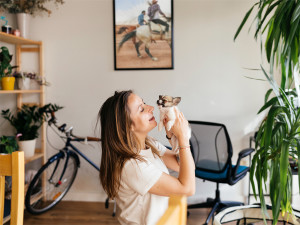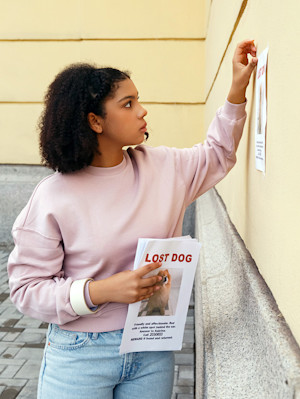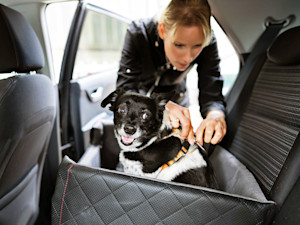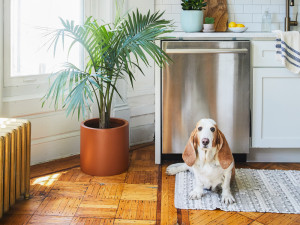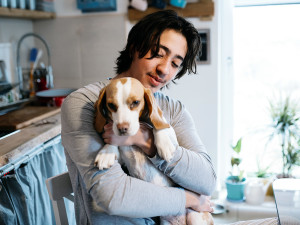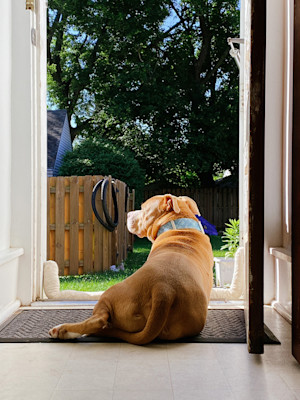Unexpected Safety Hacks For Anxious Dog Parents
Ways to keep your dog safe that you’ve never thought of
As a dedicated pet parent, your dog’s safety is paramount, but sometimes the usual advice doesn’t cover all the bases. Beyond the basic measures, there are unexpected yet crucial steps you can take to ensure your four-legged friend’s safety. From creating an emergency action plan to thwarting potential pet thieves, we’ve gathered insights from veterinarians and trainers to help you prepare for the unthinkable.
We all love our pups like family and their safety is a constant concern (whether they realise their effect on our heart rate or not). But what about the more unusual situations that you might not have thought of? What happens to your pup if you need to be rushed to the hospital, for example? Most of us haven’t considered these scenarios in detail but taking the time to plan in advance can make all the difference.
Luckily for you, my high-functioning anxiety and ability to daydream in all sorts of places means I’ve thought of them for you. Don’t worry, they’re simple and designed to give you peace of mind, not stress you out with yet another task. After all, when it comes to our pets, no precaution is too great. Whether you’re a new dog owner or a seasoned pet parent, these tips will help you create a safer environment for your dog.
Have an emergency action plan in place
I’ll admit that my mind wandering off into this (somewhat implausible) situation is what brought me to pitch this article in the first place: what happens to your pup if you’re out for a walk and you are in a medical emergency and have to be taken via ambulance to the hospital? Well, it turns out most people have absolutely no idea.
After some research and chatting to various professionals (both trainers and vets), the consensus is that the best thing to do is keep your information on you at all times. This can be in the form of a keyring or a card in your wallet, for example, whatever is easiest for you. But the key to it is the information you include.
Paramedics will generally be more focused on carrying out emergency care for the human involved than worrying about the pup, so what will often happen is that the dog warden will be called to take care of the animal (this varies depending on the NHS trust but tends to be the case). So having a go-to contact for helpful community members or the dog warden to get in touch with, instead of taking your pup to kennels is always preferable.
There has also been a recent rise in the popularity of scannable QR code pet tags, which pretty much do the same as a microchip, but it isn’t a legal requirement unlike microchips. The tag will have an engraved QR code, as well as information if you wish, and it will link through to a page with all of your pup’s information if it is scanned. This means that anyone can scan the tag and find out information to help, instead of taking your pup to a vet or dog warden to have their microchip scanned.
You should include information on who you live with (partner, family, roommates) or friends/neighbours/doggy daycare contacts who might be able to collect your pup and look after them or take them home for you. Which brings me to my next point. Have someone outside of your household whom you trust hold on to a set of spare keys for you. This will also help if you have an accident at home and have to be rushed to hospital, leaving your dog behind.
If your crisis extends more long term and you don’t have someone who is able to take care of your pet for you, there are several charities such as Mayhewopens in new tab, Dogs Trust Freedom Projectopens in new tab, Endeavouropens in new tab and Refuge4Petopens in new tab that can provide shelter and short-term foster care for the pets of people in crisis.
Take steps to prevent dog theft
It’s a sad but honest truth that there are people out there who will want to take your pup from you, to either sell on or to breed. For this reason, Dr Cat Henstridge, a vet who dispels pet myths on her Instagram and TikTok pages under the handle Cat the Vetopens in new tab, recommends including that your pup is neutered, if that is in fact the case, on their dog tag. “It’s horrible to think it but pets who are neutered are less valuable to thieves because they can’t be used for breeding,” she says in one videoopens in new tab.
Cat the Vet also recommends keeping your pet’s microchip updated with as much information as possible. Add tons of numbers, she says: “Your number, your partner’s, your parents’, your best friend’s. Make it so that if anybody finds your dog they can get in touch with you or somebody who knows who you are really easily.” She also recommends adding email addresses to the database where possible.
When your dog is microchipped, the chip will be registered with one of several Government-approved databasesopens in new tab, where you can set up an account and add as much information as you can (it will vary depending on the database, but the information they collect is pretty extensive).
Dr Cat also recommends varying your walking routes from time to time, so that your location isn’t 100 percent predictable to thieves; and never, ever, ever leave your dog unattended outside a shop for example. “It’s tempting to tie them up outside a shop while you just pop in but the risk is just not worth it,” she says.
Be wary of strangers asking you detailed questions about your dog, too. Whilst it’s nice to have a chat and discuss the highs (and lows) of being a pet parent, it’s wise to be particularly wary of anyone asking more intrusive questions such as how much your dog cost, and whereabouts you live, for example.
Dog trainer Amelia Steele also recommends teaching your dog a secret recall ‘code’opens in new tab for emergency situations. Use a word that a stranger wouldn’t be familiar with to train your dog’s recall, instead of the usual ‘come’, so that they can’t be called away from you and will only return to you.
Protect your pup when out and about
As well as advocating for your dog in public, particularly if you come across an over-friendly dog, there are several safeguarding tips you can put in place for when you’re out and about with your dog.
Katie Lottopens in new tab, a north London dog trainer, recommends always carrying a spare slip lead with you, or having one in the car/nearby “in case a dog attacks you/your dog, if another dog is lost from their owner or loose and causing havoc”, in which case you can guide them away from you and return them to their human.
“Other ideas for keeping your dog safe that I would recommend is having a back-up collar, too,” says Katie. “For example, if you use a harness, lots of dogs are able to slip out of a harness or flat collar if they really tried or it wasn’t well-fitted, so a second lead can be useful.”
“Another idea is using a GPS tracker such as an Air Tag for peace of mind in the event a dog does run off and goes missing,” says Katie. I can personally attest that this has helped bring my blood pressure down when my dog Luna has decided to play hide and seek in the woods and I can’t see her for the life of me; one look at the app on my phone and I know which way to direct my ‘I’m not mad, just disappointed’ voice.
Finally – and this one shouldn’t be too hard – keep an up-to-date picture of your beloved pup on you, so that in the event that your dog goes missing you can ask people to keep an eye out or post in groups where necessary. I don’t know about you but I will not feel pressure to take even more pictures of Luna (you should see my camera roll).


